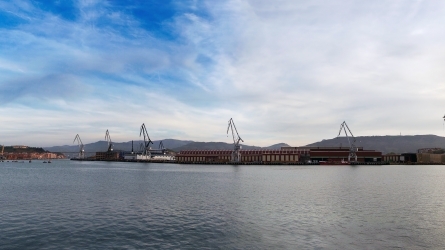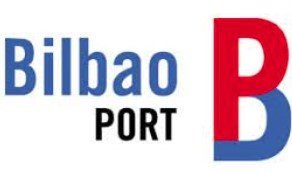
Environmental monitoring of port waters
The care of the quality of port waters as a primary environmental control aspect.
Description
This activity is part of the course program: 'Universities Looking at the Sea: Navigating Ocean Sustainability on the Training Ship Saltillo.'
The care of water quality is one of the environmental aspects that demand rigorous control in a port due to the multiple and varied pressures it faces. In the case of the Port of Bilbao, located in the estuary of Nervión Ibaizabal, the waters have historically faced significant pressures due to industrial activities in Bilbao and its surroundings. Although port activities have moved away from the urban core of Bilbao over the past two decades, these waters still require thorough quality control. Consequently, the Port Authority of Bilbao has undertaken various studies on water quality and its ecological state to assess possible impacts resulting from its activities.
Among these studies is the "Biological Surveillance Plan of the Port of Bilbao," which stems from a collaboration agreement between the Port Authority of Bilbao and the University of the Basque Country, established since 1994, with the purpose of assessing the ecological status of port waters. In this annual plan, an evaluation is presented regarding the general trends observed in the evolution of benthic communities (flora and fauna) in the Abra. Likewise, changes are analyzed at the floristic and faunistic levels (species composition and relative abundance) and at the physiognomic or structural level. This information aims to evaluate the ecological impact of the expansion works of the Port of Bilbao and the port's own activity on the benthic ecosystem of the study area.
On the other hand, we have an Environmental Monitoring Plan for the tracking and control of sand extractions in the North sector of Zone II for use as filling material in the expansion works carried out in the Port of Bilbao. In order to ensure compliance and the effectiveness of protective and corrective measures, this plan includes water quality monitoring (among other components). It involves sampling campaigns in both the construction and extraction areas, analyzing various oceanographic variables (temperature, salinity, dissolved oxygen, pH, etc.), turbidity (a possible effect of actions on optical quality), suspended material, and the presence of contaminants.
Furthermore, a pilot test has been developed to evaluate the impact of dredging operations in port waters through the simultaneous application of two sampling techniques: traditional sampling (collecting water samples using an oceanographic bottle) and passive samplers of the DGT type. This methodology provides a more accurate measure of concentration than that obtained through spot sampling, reducing the likelihood of overestimating or underestimating actual concentrations in the environment. This allows for the identification of situations and metals directly affected by dredging and enables the measurement of metals at very low concentrations, which adds value, as some metals can be toxic even at very low concentrations.
The TREC expedition is a research and citizen awareness and education activity at the highest level, coordinated by the EMBL (European Molecular Biology Laboratory), with the participation of Tara Oceans and the European Research Infrastructure EMBRC-ERIC (https://www.embrc.eu/), of which PiE-UPV/EHU is a part. It set sail in April and will conclude its journey in June 2024 after visiting 22 countries, making 42 stops, and sampling 120 points in the land-sea transition. Eight stops have been selected as super-sampling and citizen awareness sites. Plentzia-Bilbao has been chosen as one of these super-sites for both activities, which will take place for one month between September and October 2023. For the first time in 50 years, the intergovernmental laboratories of the EMBL are looking to the sea, and they are also visiting their member countries for the first time. Plentzia will be their first port of call on their journey through the Iberian Peninsula.
The expedition will combine sampling of soils, sediments, and shallow waters with selected model organisms in various habitats and ocean exploration aboard the Tara scientific research schooner. Tara has been conducting high-level scientific research for 20 years, with 12 expeditions that have circumnavigated the planet several times, with stops in 60 countries and Antarctica. With Tara, we have an increasingly comprehensive catalog of global marine biodiversity, obtained through the genomic sequencing of small drifting ocean organisms (plankton). This sailing vessel, whose scientific contribution is comparable to that of other great predecessors such as the Beagle, Erebus, or Challenger, will dock in Bilbao near the ItsasMuseum once its sampling in the Bay of Biscay is completed. During one week, from October 11th to 17th, daily guided tours of the ship's facilities will be organized.
For intertidal zone sampling, the expedition is supported by its own terrestrial mobile services and local marine research facilities, such as the PiE-UPV/EHU Marine Station. Viral, bacterial, and protist biodiversity will be analyzed, as well as multicellular groups of algae and animals. Analysis using genome sequencing methodologies, combined with advanced microscopy studies, will provide detailed and unprecedented information, associating molecular and morphological data at the ecosystem, organism, and cell levels. In addition to standard oceanographic metadata, special emphasis will be placed on the detection of bioactive compounds, as well as the physical and chemical characterization (organic and inorganic contaminants) of the sampled habitats, providing the environmental framework for the identified biodiversity and the analysis of its adaptive characteristics. This integrated description across environmental and anthropogenic gradients of micro and macroscopic life will allow for the first census of European coastal ecosystems.
Furthermore, for a month, EMBL will transport an articulated truck with advanced equipment for the molecular and microscopic analysis of biological samples to PiE-UPV/EHU, measuring 12 meters in length. This equipment was instrumental in the work for which two of its scientists received the Nobel Prize in Chemistry in the years 2014 and 2017. The aim is to establish collaborations with local scientists, opening new frontiers of knowledge at EMBL and providing technological solutions to the research community in the Basque region.
The activities of exploration and scientific research are accompanied by a program for raising awareness and training both the general public and professionals. These activities will take place at PiE-UPV/EHU, various campuses, Bizkaia Aretoa of UPV/EHU, and the ItsasMuseum. Come and explore with us!
Activity directed to
- All public
In collaboration with
Program
18-07-2023
Registro / Erregistroa
Institutional Opening session. Speaking order:
- Javier Sanchez-Beaskoetxea | UPV/EHU - Subdirector de Enseñanzas Náuticas
- Carlos Alzaga | Autoridad Portuaria de Bilbao
- Gorka Moreno Márquez | UPV/EHU - Vicerector Campus de Bizkaia
Bitácora de viaje Tripulación de estudiantes.
Visita Guiada al Museo Nautilus (limitado a 30 plazas)
“Vigilancia ambiental de las aguas portuarias“
- Alberto Ojanguren | Autoridad Portuaria de Bilbao
“PiE-UPV/EHU con la expedición TREC 2023: invitación a navegar sin fronteras por un mar de conocimiento en el Golfo de Bizkaia“
- Ibon Cancio Uriarte | UPV/EHU - Profesor PiE-UPV/EHU Director de EMBRC-Spain
Speakers

Ibon Cancio Uriarte
Docente de Biología Celular en el Departamento Zoología y Biología Celular Animal, Facultad de Ciencia y Tecnología de la UPV/EHU, es investigador de la Estación Marina de Plentzia (PiE-UPV/EHU). Es Biólogo y obtuvo un Master en Microscopía Electrónica por la Universidad de Gales y doctorado europeo en la UPV/EHU. Coordinó el Master oficial en Contaminación Ambiental y Toxicología (UPV/EHU) durante 10 años. Investigador del grupo consolidado del Gobierno Vasco “Cell Biology & Environmental Toxicology” ha participado en más de 60 proyectos de investigación nacionales y europeos. Su investigación se centra en la biología celular/molecular de la diferenciación sexual de peces, biomarcadores moleculares de disrupción endocrina y monitorización genómica de la biodiversidad marina. Publicaciones: 9 capítulos libros, 69 artículos en revistas internacionales ISI, 8 en revistas nacionales. Índice H=25.

Alberto Ojanguren
Es Licenciado en Medicina y Cirugía por la Universidad del País Vasco, Diplomado en Medicina de Empresa por la Escuela Nacional de Medicina del Trabajo y Especialista en Medicina del Trabajo por la Universidad Complutense de Madrid. Posee, además, formación adicional en Ergonomía, es Técnico de nivel superior acreditado por Osalan en Medicina del Trabajo, Seguridad, Ergonomía y Psicosociología e Higiene Industrial y posee un Máster en Gestión de Emergencias por la Universidad de Valencia. Ejerció como Jefe del Servicio Médico de Outokumpu Cooper Tubes durante 10 años. En 1984 se incorporó a la Autoridad Portuaria de Bilbao, donde actualmente desempeña el puesto de Jefe del Departamento de Salud, Seguridad y Medio Ambiente. Ha ejercido durante 10 años como Director del Instituto de formación de la Cruz Roja de Bizkaia. Actualmente es miembro del comité de expertos en Prevención de Riesgos Laborales de Puertos del Estado y Presidente de la sección de Medicina del Trabajo de la Academia de Ciencias Médicas de Bilbao.
Venue
Bizkaia
Bizkaia
Other events of your interest
There are currently no events available.


